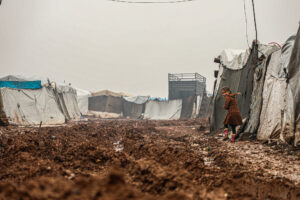In the sprawling landscape of war-torn Syria, where once vibrant fields lay desolate, a small, displaced soul named Umm Hisham found herself in the Rasha camp near Azmarin, west of Idlib. Her home, nestled south of Idlib, had been a sanctuary of beauty and tranquility, adorned with an abundance of roses that bloomed in a myriad of colors, casting their sweet fragrance into the air.
As Umm Hisham wandered through the barren camp, her eyes were drawn to a cluster of delicate plants that she had carefully nurtured amidst the harsh surroundings. Their presence reminded her of the garden back home, where life had flourished in abundance. She couldn’t help but be filled with nostalgia as she recalled the days she spent among the roses, their gentle petals brushing against her fingers and the joy they brought to her heart.
In the midst of strife and uncertainty, these plants became a source of solace for Umm Hisham. Their resilience in the face of adversity echoed her own struggles, and they served as a living testament that life could flourish even in the harshest of conditions. Each day, she would sit beside them, seeking refuge from the turmoil that surrounded her, finding comfort in their familiar beauty.
The scorching summer sun beat down on the camp, making life even more arduous for those who sought shelter within its confines. Yet, the presence of the plants offered a gentle reprieve. Their shade provided a respite from the unyielding heat, and their verdant leaves seemed to whisper tales of hope and renewal to Umm Hisham.
As time passed, she forged bonds with fellow camp dwellers who shared her longing for a return to their homes. They spoke of their cherished memories, of the laughter that once filled the streets, and the sense of belonging that only a true home could provide. Despite the harshness of their current reality, they clung to the hope that one day, they would be able to rebuild their lives and return to the places they had been forced to leave behind.
For Umm Hisham, the plants became more than just a reminder of her former home; they became a symbol of resilience and strength. Amidst the trials and tribulations, they stood tall and unwavering, just like her spirit, refusing to be defeated by the turmoil that surrounded them.
As the days turned into weeks, and the weeks into months, Umm Hisham’s hope burned even brighter. She found solace in knowing that while circumstances had displaced her from her home, the essence of what she once had could never be taken away. The memories of the roses, the love she shared with her family, and the sense of belonging she felt in her homeland remained etched deep within her heart.
Through the plants, Umm Hisham learned a profound lesson about life – that even in the most difficult of times, hope can be found in the simplest and most unexpected of places. The camp, once a symbol of despair, had now become a beacon of hope, for it was here that she had discovered the strength to persevere.
And so, in the midst of displacement and adversity, Umm Hisham continued to water the plants and nurture them with love. In return, they gifted her with the courage to endure, the wisdom to find beauty in the midst of chaos, and the hope to believe that one day, she would return to her beloved home, where roses would once again bloom abundantly, and the sweet scent of their petals would fill the air with the promise of a brighter future.






